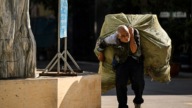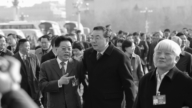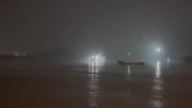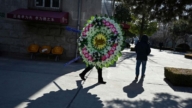【新唐人2013年10月29日訊】美國華人當中,有一位以英文寫作並且獲得世界推理小說大獎的作家裘小龍,至今已經出版了11本偵探懸疑小說,他的作品已經在多個國家被翻譯成當地語文出版。但是令他苦惱的是,在他出生的國家——中國,他的作品常常遭遇出版商不可理喻的刪減,而故事發生的地點——上海,也只能用H市來取代。
裘小龍是以英文創作的華裔小說家和詩人,畢業於「北京外國語大學」,曾經師從著名的翻譯家卞之琳。裘小龍早年以翻譯西方印象派詩歌而知名。
80年代末,裘小龍訪美,90年代出版反映中國巨大變遷的驚悚偵探小說。2000年發表長篇英文推理小說《紅英之死》,隔年榮獲第三十二屆世界推理小說大獎。他的作品已在法國、德國、意大利等國翻譯出版。裘小龍目前居住在美國,在聖路易斯市「華盛頓大學」教授中國文學。
但是在自己的祖國出版自己的作品,裘小龍常常感到沮喪。裘小龍告訴《新唐人》,他的小說都是以他的故鄉上海為背景,但是這些出版商卻以H市來取代上海。
旅美小說家、詩人裘小龍:「他們覺得你這樣寫,好像對上海不是一件很光彩的事情。那麼你說這個東西如果發生在一個子虛烏有的城市就沒有關係,你要說發生在一個中國的城市,具體的那就不行。這是他們的邏輯,我覺得這是沒有道理的。因為這小說本來就是虛構的事情。你說美國人寫小說你說這個故事不能發生在紐約,沒有這樣的講法。」
因為上海這兩個字無法見光,裘小龍甚至決定拒絕在中國出版他的《雙城案》。
裘小龍:「所謂《雙城案》,我寫的是在兩個城市之間的一個故事,一個是我現在生活的聖路易市,在美國的,一個就是上海,那麼如果出版商還是要像以前做的話,那我覺得整個書就not make sense,就很荒誕了,你說,這裡是一個美國的真實的城市,另外一面,你又是一個虛構的城市,我覺得就不像話了。我寧可也不要出了。」
中國出版商對小說內容的刪改大刀闊斧,理由卻是掩飾黑暗面。比如,刪除兇手被快速處決的情節,因為這樣的「嚴打」,顯得中國缺乏法律程序;比如,刪除對老幹部的負面描寫,因為老幹部的形象需要正面。
而最初從事詩歌創作的裘小龍,原來只是想寫一本可以反映中國當代社會的小說。
裘小龍:「因為在這以前,我是寫詩的,不是寫小說的。所以我在寫第一本小說的時候,在結構上碰到一些麻煩,比較凌亂,串不起來。然後我想著,我可以試著用偵探小說的辦法,因為現在西方,尤其歐洲北歐那邊,有一種偵探小說,他的寫法就是很社會學的,他跟傳統的偵探小說不一樣,他更多的是講,在甚麼樣的社會背景下,能夠這樣做事?」
裘小龍抱著借鑒偵探小說的寫法,把第一本書寫完了,出版社因為喜歡這本書,還跟他簽了三本書的合同,要求他按照同樣的體裁,同樣的主人翁寫成系列小說。
裘小龍確實覺得,用寫偵探小說的方法來寫中國比較便利。因為作為一名探長或警察,可以到處去調查案子,可以探尋社會上的各種問題。他的每部小說,都側重反映中國某個社會或政治層面的問題。
裘小龍:「你比如說,我有一本小說,叫《當紅是黑的時候》,我就會特定去寫『文革』在當代中國留下的陰影和後果。我會特別注重這麼一個層面。那麼像我最近有一本寫無錫太湖那個污染背景的,除了那個偵探小說之外,它就更寫了中國污染的問題。所以每一本書我都有一定偏重。包括《雙城案》,好幾本,都講到中國當代腐敗的問題。」
裘小龍1988年前往美國做訪問學者,隔年北京發生「六四」學生運動。裘小龍在美國參與聲援,並且組織籌款募捐活動,當時《美國之音》對他進行了報導,他因此成為了中共當局眼中的敏感人物。裘小龍取消回國,留在美國攻讀比較文學博士學位。
採訪編輯/秦雪 後製/鍾元
China Renames Shanghai as H City in Qiu Xiaolong’s Novels
Qiu Xiaolong, an award-winning English language writer
based in the U.S., who is known for his detective fiction.
He has published 11 novels, which have been translated
into many languages.
But what worries him is that in his homeland of China,
his novels are often reedited.
The plots of his novels are set in Shanghai,
but Chinese publishers replaced it with “H City".
Qiu Xiaolong, a Chinese novelist and poet in English
language, is a graduate of Beijing Foreign Studies University.
He was a student of well-known translator Bian Zhilin.
In his early years, Qiu became famous by translating
Western Impressionistic Poetry.
Qiu visited the U.S. in the late 80s.
He publishes detective novels set in China at the point when
it was making momentous changes in the 90s.
In 2000, he published his first book “Death of a Red Heroine"
which won the Anthony Award for Best First Novel.
His works have been translated and published in France,
Germany, Italy and other countries.
Qiu currently lives in the U.S. in St. Louis, Missouri,
where he teaches Chinese literature at Washington University.
But Qiu feels very frustrated about
the state of his publications in his home country of China.
Qiu told NTD that his novels
are set in his hometown Shanghai.
However, the publishers in China replaced “Shanghai"
with “H City" in his novels.
Qiu Xiaolong: “They feel my using Shanghai in the novel
in this way isn’t an honorable thing.
But they feel it’s fine if the story happened in this H City,
which even doesn’t exist.
They feel that it isn’t good if the novel clearly describes
the story as happening in a city in China.
This is their logic, which I think it is unreasonable.
Because it’s a fictional story, it’s unnecessary to change it.
If an American wrote a novel, who would tell them they can’t
have the story set in New York? This has never happened."
As “Shanghai" has been censored from his novels in China,
Qiu refuses to publish his novel “A Case of Two Cities" in China.
Qiu: “The story of ‘A Case of Two Cities’
takes place in two cities.
One is St. Louis, where I live now, and the other is Shanghai.
If the publisher still does the same as they did before,
I think the whole story wouldn’t make sense.
It’d be absurd.
One is a real city in the US, and one is a made up city.
I think it is outrageous.
I would rather not to have it published."
Chinese publishers re-edited Qiu’s novel
to cover up China’s actual dark secrets.
For example, they deleted some parts that
had a murderer killer quickly executed.
This kind of “crackdown" shows China’s lack of legal procedure.
They also deleted negative parts on veteran cadres,
as they only allow veteran cadres to be portrayed positively.
Qiu’s initial thought was to write a novel
to reflect China’s contemporary society.
Qiu: “Prior to this I wrote poems, not novels.
Thus when I wrote my first novel, I encountered some
difficulties in the composition.
It was piece by piece, I couldn’t put all together.
Then I thought to try the way of detective fiction.
Because in the Western, especially in North Europe,
there are types of crime-thriller novels that have a writing style
that’s very sociological, and written differently
from the traditional detective novels.
They focus on how things are done in such and such society."
Qiu drew from the detective novel style to finish his first book.
The publisher liked his book and signed a three book contract.
The publisher requested him to use the same style and the
same main character to write a series of novels.
Qiu says he feels detective fiction
is a convenient way to write about China.
Being an detective or a policeman,
he can go anywhere to investigate the case.
He can explore a variety of social issues.
Each of Qiu’s novels focus on social
or political problems in China.
Qiu: “For example, one of my books ‘When Red is Black’,
I specially write about the shadow of the Cultural Revolution
and its influence on modern China.
I can focus on this issue.
The latest story I am writing uses
the pollution of Wuxi’s Tai Lake as a setting.
Apart being a detective story,
it focuses more on China’s pollution problems.
Thus, in each book I have a focus issue,
including my book ‘A Case of Two Cities’.
Several of my books talk about China’s current corruption."
Qiu came to the US as a visiting scholar in 1988.
The next year, the Tiananmen Square Student Protest took place.
Qiu organized fundraising in the U.S. for Chinese students,
and when Voice of America reported on his efforts,
he became considered a sensitive figure by the Chinese regime.
Qiu canceled his return to China, and remained in the U.S.
to pursue a doctorate in comparative literature.




























